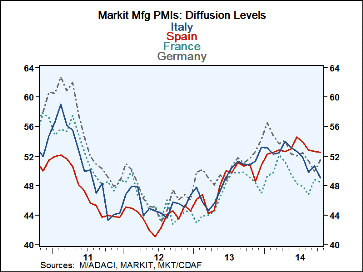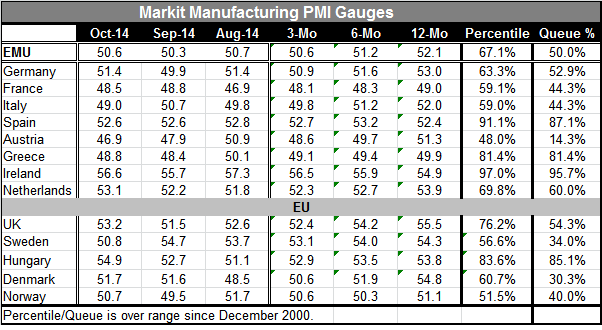 Global| Nov 03 2014
Global| Nov 03 2014EMU Manufacturing PMI Is Revised Lower
Summary
The overall European Monetary Union manufacturing index for October was revised lower from its preliminary reading, but it still shows a gain relative to September. The index stands at 50.6 in October, compared to 50.3 in September, a [...]
 The overall European Monetary Union manufacturing index for October was revised lower from its preliminary reading, but it still shows a gain relative to September. The index stands at 50.6 in October, compared to 50.3 in September, a narrow gain, but still indicating expansion (above 50). Even with this rise, there is not much in the way of momentum for this gauge over 12 months, as it stood at 52.1 12 months ago; six months ago it was up to 51.2. But three months ago it stood at 50.6, the same as this month's value. The queue standing of the EMU gauge is at the 50th percentile, exactly on top of its median. The EMU gauge has been higher than this 50% of the time and lower than this 50% of the time.
The overall European Monetary Union manufacturing index for October was revised lower from its preliminary reading, but it still shows a gain relative to September. The index stands at 50.6 in October, compared to 50.3 in September, a narrow gain, but still indicating expansion (above 50). Even with this rise, there is not much in the way of momentum for this gauge over 12 months, as it stood at 52.1 12 months ago; six months ago it was up to 51.2. But three months ago it stood at 50.6, the same as this month's value. The queue standing of the EMU gauge is at the 50th percentile, exactly on top of its median. The EMU gauge has been higher than this 50% of the time and lower than this 50% of the time.
Among the four largest economies, Germany, France, Italy and Spain, two are showing declines in manufacturing activity while two are showing increases in activity in October. Germany's manufacturing sector improved, rising from a declining phase to a small increasing phase. France and Italy each moved lower with Italy moving into a contracting phase from what had been an expansion phase, to join France. Spain's manufacturing PMI reading is exactly the same in September and October, showing expansion.
As for the PMI standings of these four countries, Spain is on top with its manufacturing sector higher than this only 13% of the time; its standing is in the 87th percentile of its historic queue. Germany is in its 52.9 percentile, higher roughly 48% of the time. Both France and Italy sit in their respective 44.3 percentiles, six percentage points below their respective historic medians.
Greece improved month-to-month but is still showing a contraction with the PMI at 48.8 in October; nonetheless, the country has its PMI in the 81st percentile of its historic queue. But that result is not what it seems. It simply demonstrates how persistently weak conditions have been in Greece. For Greece, a small contraction is considered good news historically. Ireland's index moved up to 56.6 in October from 55.7 in September, showing an improving trend. It sits very high at its 95th historic percentile. The Netherlands also moved up but has been moving lower consistently; yet it stands in the 60th percentile of its historic queue. Austria has been steadily slipping and resides in the 14% of its historic queue, an extremely weak reading.
The standings, the monthly changes as well as the momentum in the euro area show radically different conditions across different economies. Only Ireland shows persistent increases in its sequential levels from 12 months to six months to three months. The euro area itself, as well as, Germany, Italy, Austria and the Netherlands also show sequentially deteriorating levels of activity, despite this month's results.
Still, on the month, among these separately reporting countries, we have four showing declines and four showing increases, a mixed result. Germany's month-to-month increase is the largest rising by 1.49 points offsetting the 1.47 point drop in September. But Italy has the biggest drop, falling by 1.73 points, more than offsetting the 0.9 increase of the month before. At best the showings in the month are mixed; nonetheless, they fit into an overall pattern of continued deterioration, since so many of the sequential levels are still in a declining phase. Viewed in a slightly different way, Germany, France, Ireland and the Netherlands each have the October readings above their respective three-month ago level. Still, this is only four (of eight) members underscoring the mixed message from this month.
Turning to the members of the EU that have not adopted the common currency, in the bottom of the table, we see slightly better results on the month. All are showing expansions in October. Among this group, only Sweden has eroded on the month. Although it has moved lower with a huge decline of 3.9 points in October, more than offsetting the increases of the prior two months. The U.K., Hungry, Denmark and Norway each post increases month-to-month. Among these countries, only the U.K. shows consistent deterioration in its sequential moving averages. However, Sweden shows declines over three months and six months with its 12-month average unchanged.
On balance, the PMI data for Europe are weaker in October and the European Monetary Union is fairing somewhat worse than the nonmonetary union members of the EU. Still there was some sense in which the current EU data are mixed and the EMU is showing a pro-growth PMI value in manufacturing (above 50). The EMU PMI is exactly at its historic median, allowing us to say that performance there is average, although it seems worse.
Elsewhere, the global PMI measures show that China's manufacturing index is unchanged from its preliminary value and shows a very small uptick in activity. However, China's nonmanufacturing index, also available today, shows continued expansion but with slippage. The global economy is still struggling.

Robert Brusca
AuthorMore in Author Profile »Robert A. Brusca is Chief Economist of Fact and Opinion Economics, a consulting firm he founded in Manhattan. He has been an economist on Wall Street for over 25 years. He has visited central banking and large institutional clients in over 30 countries in his career as an economist. Mr. Brusca was a Divisional Research Chief at the Federal Reserve Bank of NY (Chief of the International Financial markets Division), a Fed Watcher at Irving Trust and Chief Economist at Nikko Securities International. He is widely quoted and appears in various media. Mr. Brusca holds an MA and Ph.D. in economics from Michigan State University and a BA in Economics from the University of Michigan. His research pursues his strong interests in non aligned policy economics as well as international economics. FAO Economics’ research targets investors to assist them in making better investment decisions in stocks, bonds and in a variety of international assets. The company does not manage money and has no conflicts in giving economic advice.






